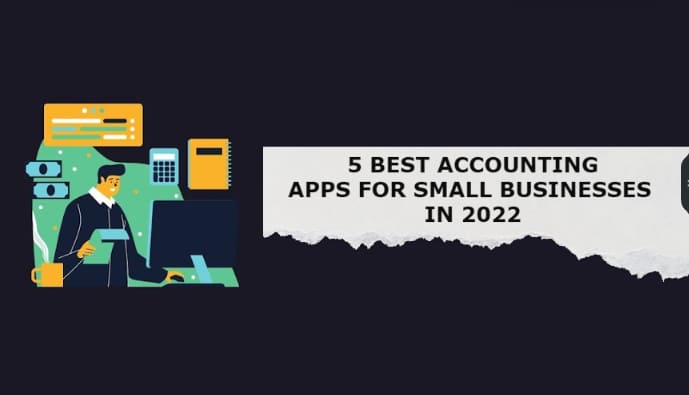In this blog, we have curated a list of 5 best accounting apps for small business owners that can help them manage accounting. To successfully run a small business, you must be well aware of the best accounting apps to manage your finances. Being a small business owner can be rewarding in many ways, but tasks like maintaining budgets, ensuring invoices are tracked and paid, and managing accounts payable can be difficult. Without the proper software to get the job done, it’s entirely possible companies can fall into disarray. To address that problem, many small business owners turn to some of the best accounting apps, programs that usually run in the cloud and have the ability to handle all of the accounting needs of the operation.
In fact, this software virtually takes on roles like controller, chief financial officer, and accounts payable manager that you’d find in larger organizations. But before you set out to find the Accounting App For Small Business, check out the guide below. The following six solutions are the best accounting software and each one offers a diverse set of features, reasonable pricing, and everything else you need to manage Accounting App For Small Business more efficiently.
1. QuickBooks Online
- Cloud or Desktop: Cloud-based; PC software available with the Desktop Pro Plus plan
- Clients Supported: Windows, Mac, Linux, iOS, Android
- Cost: From $25/Month
- Expert Help Available: Yes
- Payment App Integration: Yes
- Payroll management: Yes, additional fee
Quickbooks Online is one of the more popular cloud-based accounting platforms for small businesses. And for good reason: It offers one of the longest lists of features of any option in this roundup. When you sign up for Quickbooks Online, you have the option of choosing from three options: Simple Start, Plus, Advanced. And as you might expect, pricing will vary depending on the version you choose. The same goes for the features you’ll get with each option.
The Simple Start option comes with the ability to track your income and expenses, invoice and accept payments, and run basic reports. You can also track sales and sales tax data. If you jump to the Essentials option, you’ll be able to manage your bills and allow multiple users to access your account, as well as track time. The top-notch Advanced version offers project and inventory tracking and the ability to manage 1099 contractors.
2. Xero
- Cloud or Desktop: Cloud-based
- Clients Supported: Windows, Mac, Linux, iOS, Android
- Cost: From $12/Month
- Expert Help Available: Yes
- Payment App Integration: Yes
- Payroll management: Yes, additional fee
Xero is a popular accounting platform that works both in your PC’s web browser or on your mobile device with help from Android and iPhone apps. And at a starting price of $12 per month, it offers one of the best values of any service in this roundup. Xero offers three plans — Early, Growing, and Established. The differences between them center on the number of invoices and quotes you can send each month, how many reconciled bank transactions you have, and whether you need to run payroll.
In other words, Xero plans are designed to scale with the size of your business. But before we get into the differences between these tiers, you should know that all three Xero versions come with a variety of standard features including the ability to analyze financial reports, manage invoicing, and connect to bank accounts to integrate all of your latest transactions. Xero integrates with more than 700 apps, including those that track inventory and time, to help you keep your entire business running smoothly.
3. NetSuite
- Cloud or Desktop: Cloud-based
- Clients Supported: Windows, Mac, Linux, iOS, Android
- Cost: Custom pricing based on your needs
- Expert Help Available: Yes
- Payment App Integration: Yes
- Payroll management: Yes, additional fee
NetSuite is part of the Oracle umbrella, a company that rivals QuickBooks in terms of name recognition and popularity. That’s because it’s one of the more advanced and feature-rich options on our list: a unified business management suite that brings ERP, CRM, and e-commerce under one roof.
With Netsuite, you can gain real time insights into numerous financial metrics and automate repetitive tasks allowing your finance team to focus on reviewing transaction details, and analyzing trends. Netsuite’s cloud based solution allows your accounting team, executives, operational teams and employees to work from anywhere, anytime. That’s not to say that it’s difficult to use if you’re not that tech-savvy; in fact, NetSuite’s cloud-based accounting software makes it easy to track and manage expenses so you can streamline your business operations.
NetSuite doesn’t have traditional subscription plans with a pre-determined set of features and limits. Instead, it offers you a customized annual pricing structure based on the size and specific needs of your business. This is determined by the optional modules for features that you want and how many users need access to it. You’ll have to contact them yourself to get your customized quote, but this is actually a good thing, as you’ll get a plan that’s tailored to how your business operates rather than a “one size fits all” solution.
4. Freshbooks
- Cloud or Desktop: Cloud-based
- Clients Supported: Windows, Mac, Linux, iOS, Android
- Cost: From $15/Month
- Expert Help Available: Yes
- Payment App Integration: Yes
- Payroll management: Yes, additional fee
Due in large part to a nice slate of features and some aggressive advertising in podcasts, Freshbooks has come on the scene in a big way. And it offers an outstanding solution. Like Quickbooks Online, the cloud-based Freshbooks comes in three versions: Lite, Plus, Premium. The Lite version is ideal for small businesses that only need up to five people to access the financials, while Plus is available for up to 50 people. The Premium version allows for an unlimited number of billable clients.
The Lite version offers unlimited invoicing and estimating for up to five clients, as well as time-tracking and online credit card payments. If you want to send payment reminders, charge late fees, and get accounting reports like general ledgers and charts of account, you can move up to the Plus version. The highest-end Premium option includes all of the features you’ll get in Plus while allowing you to add many more people to the account.
5. Wave Accounting
- Cloud or Desktop: Cloud-based
- Clients Supported: Windows, Mac, Linux, iOS, Android
- Cost: From $0/Month
- Expert Help Available: Yes
- Payment App Integration: Yes
- Payroll management: Yes, with Payroll plan
The next to be on the list of 5 Accounting App For Small Business. Wave Accounting has established itself as one of the leading third-party cloud-based solutions providers outside of QuickBooks and Oracle. The company’s accounting software is aimed squarely at the small business owner who wants some accounting help.
Like most other services in the industry, there are three plans for Wave Accounting (Free, Payments, and Payroll), but the pricing structure is different than the others. The basic Free plan allows for unlimited income and expense tracking as well as invoicing, and is great if your accounting needs are simple. The Payments tier is a pay-per-use plan which charges a fee of between 1% and 3.4% per transaction, depending upon the method of payment.
This concludes our list of 5 Accounting App For Small Business that you can use to manage your business and finance aspects.
Read Our Latest Blog: 10 Exciting Space Documentaries for a Journey to the Beyond











